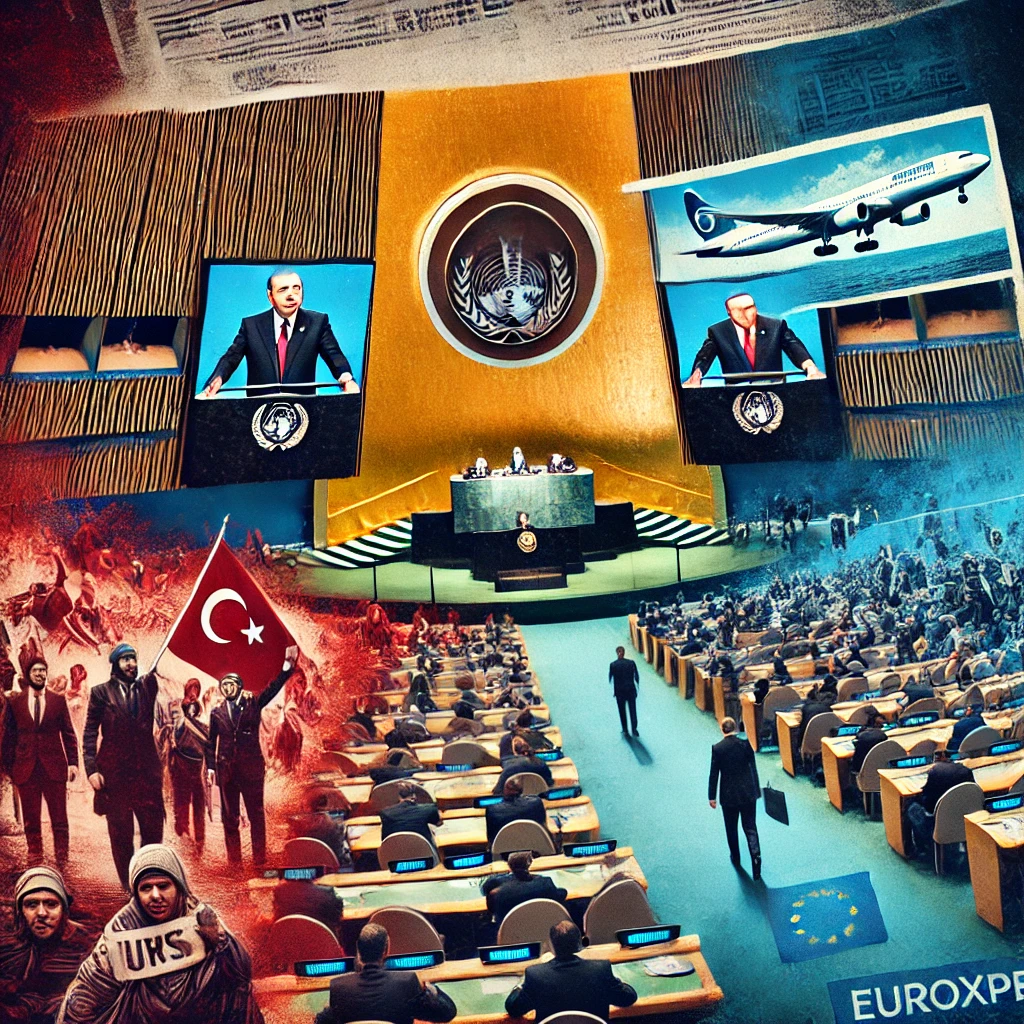During his speech at the 79th United Nations General Assembly in New York, Turkish President Recep Tayyip Erdoğan called for immediate international intervention to halt the ongoing violence in Gaza. Addressing the world leaders, Erdoğan emphasised the necessity for collective action, especially targeting Israel’s increasing aggression and urging the global community to recognise the State of Palestine without further delay.
Erdoğan’s speech came after the UN Secretary-General Antonio Guterres and US President Joe Biden had already addressed the assembly. In a stern tone, Erdoğan challenged Israeli Prime Minister Benjamin Netanyahu, accusing Israel of genocide in Gaza. He drew a controversial comparison, stating that Netanyahu’s actions paralleled those of Hitler. Erdoğan urged the world to take decisive steps against Israel, citing the failure of the UN Security Council’s Resolution 2735, which has yet to be implemented.
In a bold move, Erdoğan stressed that Turkey had cut trade relations with Israel and increased humanitarian aid to Gaza, positioning itself as the largest contributor to the besieged region, with over 60,000 tonnes of aid delivered. He also called for the establishment of a protection mechanism for Palestinian civilians, asserting that the international community must not turn a blind eye to the atrocities unfolding in Gaza.
The Call for the Recognition of Northern Cyprus
Erdoğan’s speech also touched upon the Eastern Mediterranean and the long-standing issue of Northern Cyprus. He urged the global community to recognise the Turkish Republic of Northern Cyprus (TRNC), criticising the federation model for Cyprus as outdated and ineffective. According to Erdoğan, the presence of two distinct peoples and two distinct states on the island must be acknowledged, and the international embargoes on the TRNC should come to an end.
He made it clear that Turkey’s position in the Eastern Mediterranean is pivotal, not only due to its extensive coastline but also because of its role in safeguarding the rights of the Turkish Cypriots. Erdoğan called upon the global community to engage diplomatically and economically with Northern Cyprus, arguing that any sustainable solution for Cyprus must reflect the realities on the ground.
Syria, Iraq, and Regional Stability
Erdoğan’s speech also highlighted the ongoing instability in Syria, where he expressed concern over the lack of progress in achieving national reconciliation. He reiterated Turkey’s commitment to supporting a peaceful resolution in line with the UN Security Council Resolution 2254.
Regarding Iraq, Erdoğan praised the country’s efforts in counter-terrorism and regional integration, emphasising the importance of economic development and infrastructure rebuilding. He called on the international community to support Iraq’s development projects, such as the Development Road Initiative, which could prove critical in stabilising the region. Erdoğan linked these efforts to the need for eliminating the PKK threat, which remains a significant security concern for Turkey.
A Call for Peace in Ukraine
Finally, Erdoğan addressed the ongoing war between Russia and Ukraine, lamenting the prolonged conflict that has now entered its third year. He stressed the need for a just and lasting peace, reiterating Turkey’s commitment to supporting diplomatic efforts that respect Ukraine’s territorial integrity. Moreover, Erdoğan reaffirmed Turkey’s adherence to the Montreux Convention, which governs the control of naval passage through the Turkish Straits, particularly in light of the war.
Erdoğan’s speech at the UN General Assembly touched on a wide range of global issues, reinforcing Turkey’s role as a significant player on the world stage. From calling for urgent action on Gaza to advocating for the recognition of Northern Cyprus and addressing critical regional conflicts, Erdoğan’s message was clear: Turkey is prepared to lead on matters of justice, stability, and peace.
Erdoğan’s leadership has come under intense scrutiny in recent years, particularly due to his increasingly authoritarian policies and rhetoric. His aggressive stance towards the LGBTQ+ community, artists, and political opponents has created a deeply polarised society. These actions have contributed to a significant wave of emigration from Turkey, with over 1 million Turkish citizens leaving the country according to official figures. Many of those leaving are seeking asylum in Europe, the US, and Canada, often citing political repression, human rights violations, and the lack of freedom of expression as their reasons(
Erdoğan’s frequent attacks on marginalised groups, including labelling the LGBTQ+ community as “deviant structures,” and his withdrawal from the Istanbul Convention, which was designed to protect women’s rights, have drawn sharp criticism from European Union countries and human rights organisations(
The economic crisis in Turkey, marked by high inflation and a plummeting currency, has exacerbated these issues, pushing many Turks to seek a better life abroad(
This significant exodus raises questions about Erdoğan’s credibility on the global stage. While he speaks of justice and human rights in forums such as the United Nations, the situation within Turkey often tells a different story. The erosion of rule of law, the targeting of dissenters, and the overall decline in democratic freedoms leave many wondering how seriously international leaders should take Erdoğan’s calls for action(
At a time when Turkey’s justice system is under fire for lacking independence, the gap between Erdoğan’s rhetoric and the realities in Turkey has left Western democracies questioning his sincerity. How this will affect Turkey’s standing in the international community, particularly among EU nations, the US, and Canada, remains to be seen.
This trend highlights the ongoing debate about Turkey’s future under Erdoğan’s leadership and the challenges it poses to European relations and global diplomacy.






